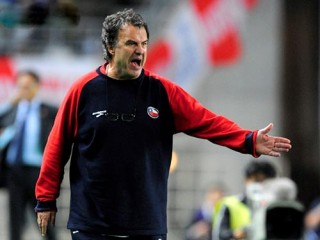
Marcelo Bielsa biography
Date of birth : 1955-07-21
Date of death : -
Birthplace : Rosario, Argentina
Nationality : Argentinian
Category : Sports
Last modified : 2010-05-05
Credited as : Football player and coach, El loco, World Cup
1 votes so far
As a child Marcelo Bielsa opted to support Newell's Old Boys instead of neighbors and eternal rivals Rosario Central, the team his father passionately followed. Coming from a family steeped in politics and law, Bielsa decided to break with tradition by dedicating his life to the sport of football. His vocation was in stark contrast to that of his older brother Rafael who is a politician (as of 2007, national deputy from the Capital District of Buenos Aires), while his sister María Eugenia is a former vicegovernor of the province of Santa Fe.
He played as a defender in Newell's Old Boys First Division Team, but soon retired at the age of 25. Bielsa went on to develop his career as coach in that team after qualifying as a physical education teacher. He led Newell's to several wins in the early 1990s.
In 1992 he moved to Mexico where he had spells in charge of F.C. Atlas A.C. and Club América. In 1997 he returned to Argentina to manage Vélez Sársfield.
Career
In 1980 shortly after retiring from playing in professional football, Bielsa decided to start a new career as a football manager. His first assignment was coaching the youth divisions of Argentine club Newell's Old Boys. In 1990 Bielsa was given the task of managing Newell's first team where he would later go on to win the 1990 Torneo Apertura and the 1990-91 Torneo Integración defeating Boca Juniors in penalties. El Loco managed the squad that competed in the final of the "1992 Copa Libertadores" losing to São Paulo on penalties. Weeks later after enduring defeat in the Copa Libertadores final, Bielsa and Newell's won the 1992 Torneo Clausura.
In 1998 Bielsa was given the managers job at Espanyol but he soon left after being offered the Argentina job later that year, taking over after a four-year period by Daniel Passarella as manager. Argentina won the qualifiers to 2002 World Cup but did not go through the first round. Despite this, Bielsa was given a second chance to lead Argentina to major success and stayed on his position. Albicelestes were runners-up in 2004 Copa América and won the 2004 Olympic Games' golden medal prize. Argentina became the first Latin American team to win the Olympic title in football since 1928, when they were beaten by Uruguay in the Amsterdam final.
Surprisingly, Bielsa resigned at the end of 2004 and José Pekerman became Argentina's manager.
The Chilean national team
Currently, Marcelo Bielsa is the coach of Chile's National team, leading the team to the 2010 Fifa World Cup in South Africa. Bielsa's current contract with Chile is a length of 3 years with a 1.5 million dollar annual income. Under his guidance the Chilean national team has undergone many historic firsts. Chile for the first time were able to earn a point playing Uruguay in Montevideo. Chile also suffered their worst defeat ever when playing at home during qualifiers losing 0-3 against Paraguay. This historic low was repeated again when Chile lost 0-3 against Brazil. On October 15, 2008, Bielsa masterminded a supremely well played match 1-0 win over his native Argentina; it was Chile's first win ever over Argentina in official matches and prompted the resignation of Argentina coach Alfio Basile. Chile soundly bested the host Peru in a 3-1 match in Lima, a location where Chile had its last victory in 1985. Bielsa then had Chile win 0-2 at the Defensores del Chaco Stadium against host Paraguay after almost 30 years. He and the Chilean national team continued the road to the World Cup with a victory over Bolivia, 4-0. After a 2-2 tie against Venezuela in Santiago and going to Brazil to lose 2-4 against them, the Chile national football team finally achieved the qualification to the 2010 World Cup by defeating Colombia 4-2. By helping Chile to qualify to a World Cup after 12 years, he as reached almost an idol status in that country.
Bielsa's appointment has brought about visible changes in the Chilean set-up, with the fast-tracking of young talents and a more attacking mindset away from home.
















